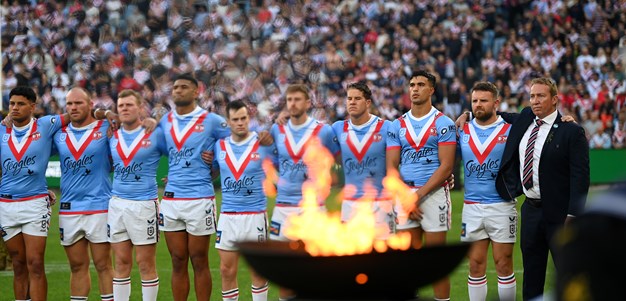Discipline on the field has never been more important in the NRL, with latest statistics revealing 80 tries in the opening six rounds coming directly off the back of penalties.<br><br>The need to stay out of trouble has never been magnified more than during the Newcastle-St George Illawarra game last weekend, where all of the Knights’ tries and two of the three Dragons’ tries came after penalties. <br><br>The Knights have now scored a third of their tries so far this season after receiving a penalty, using the subsequent field position and structure to their advantage. They have also managed to defend more stoutly than any other side after conceding a penalty – allowing just eight per cent of their conceded tries after an infraction – despite the fact they are the second-most penalised team in the competition.<br><br>The Dragons, on the other hand, are proving terrible after breaking the rules – with a whopping 39 per cent of their conceded tries coming after they have been nabbed by the referees. Cronulla (30 per cent), the Gold Coast (28 per cent) and Manly (27 per cent) are also poor at responding after being penalised – which is a worry given they are some of the most-penalised teams in the NRL.<br><br>In today’s fast-paced game, repeat sets from penalties are magnified as teams are unable to defend for large chunks of time. Even if they do survive the onslaughts, the fatigue factor kicks in later in the game.<br><br>“I think the average over the past few seasons has been somewhere around 35 per cent of tries coming off the back of penalties, so it certainly is significant,” Newcastle coach Brian Smith says.<br><br>“Most teams have some sort of structure or set pieces they can use and they’ll also know how the opposition is going to structure their defence so it gives you an opportunity to take a deep breath, get yourself organised and hopefully execute well. <br><br>“When you get ‘live’ ball from an error or kick-return you aren’t sure where you are starting from so it is a little harder to execute set plays, but with a penalty you get that chance.”<br><br>Of the 10 main categories a try-scoring set can come from (kick, turn-over, scrum, penalty, drop-out, kick-off, 20-metre tap, touched in flight and hand-over) penalties leads the way so far in 2009.<br><br>It’s no surprise the other major category is ‘scrum’ (79 tries), as the break also gives teams a chance to attack in a similar vein.<br><br>“Giving away penalties is crucial,” Smith tells nrl.com. “The back-to-back penalties are the whammies. You give away one that’s bad, you give away two it’s horrible and you get to where teams give away four or five or six in a row and then you can almost guarantee you’ll be scored against in that period of time.<br><br>“You’re also on the back-end of field position and possession, so on the energy barometer you can almost certainly assume you’ll be on empty at the end of that.”<br><br>NRL referees boss Robert Finch says it’s wrong to point the fingers at the officials whenever higher penalty counts come about or whenever the importance of not giving up penalties is raised.<br><br>“We certainly understand the importance of every penalty we award. There is no doubt teams score points off the back of them,” Finch says.<br><br>“Our debrief and review system is obviously very detailed. We review every ruck, every play and of course every penalty. <br><br>“There are clear guidelines set and we meet with the coaches twice a year to ensure they know what the key indicators are and they understand the laws of the game. That’s what we are there to implement, and we do so.<br><br>“The bottom line of it all is the rules and key indicators are put in place to ensure we get a spectacle and everyone knows what’s required. The referees’ performances are measured against those key indicators each week and penalties are there as a line in the sand for players to abide by. <br><br>“This is what we expect in the ruck, this is what we expect on the 10 metres… and so on; and it’s up to the players to conform.”<br><br>Coach Smith says the importance of having discipline and not giving up penalties can go as far as affecting an individual’s career; such is the importance of not giving up more field position.<br><br>“Players do not want to have a name or reputation for being penalised,” he explains. “Players need to improve in that regard because occasionally they have lost positions and even contracts for not getting themselves sorted as far as penalties are concerned.”<br><b><br>Tries scored from penalties: </b>Newcastle 33%, Parramatta 30%, North Queensland 30%, Canberra 29%, Warriors 25%, Brisbane 23%, Cronulla 22%, South Sydney 19%, Bulldogs 19%, Melbourne 17%, Penrith 13%, St George Illawarra 13%, Manly 13%, Wests Tigers 11%, Gold Coast 8%, Roosters 8%.<br><br><b>Tries conceded after penalties: </b>St George Illawarra 39%, Cronulla 30%, Gold Coast 28%, Manly 27%, Wests Tigers 22%, Bulldogs 22%, Penrith 21%, Warriors 21%, North Queensland 20%, Brisbane 20%, South Sydney 18%, Parramatta 15%, Canberra 14%, Melbourne 13%, Roosters 9%, Newcastle 8%. <br>
You have skipped the navigation, tab for page content

National Rugby League respects and honours the Traditional Custodians of the land and pay our respects to their Elders past, present and future. We acknowledge the stories, traditions and living cultures of Aboriginal and Torres Strait Islander peoples on the lands we meet, gather and play on.
